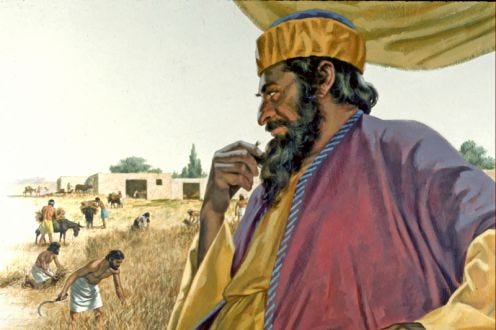INTRODUCTION
Stewardship is based on the realization that everything we have belongs to God and He wants us to use them to accomplish His purposes.
WHY THIS PARABLE?
Jesus was in the middle of teaching when a man requested: “Master, speak to my brother, that he divide the inheritance with me” (Lk.12:13).
The first response from Jesus was to explain that this wasn’t his job (Lk. 12:14).
Reflection 1: Why do you think Jesus said it is not His work to judge in the matter brought before Him? Does it mean that He has no judicial power, despite being the King of kings and the Lord of lords? Look up Jn. 18:36. Compare Lk 12:15.
THE MEANING OF THE PARABLE OF THE RICH FOOL
The point of the parable of the rich fool is twofold:
1. We are not to devote our lives to the gathering and accumulation of wealth. Look up Ecl. 2:18. Compare Matt. 6:25, 31-33.
▪︎If money is your master, that means God is not (Matt. 6:24. Compare Mal. 1:6.
2. We are not blessed by God to hoard our wealth to ourselves.
▪︎We are blessed to be a blessing in the lives of others and to build the kingdom of God. To abound in every good work.
▪︎If we honour God with what He has given us, He will bless us with more so that we can honour Him with more. Look up 2Cor.9:6-9.
LESSONS FROM THE PARABLE OF THE RICH FOOL
By all standard, the world will call this man a successful, wise and intelligent man but God called him a fool.
▪︎Note that Jesus did not condemn the man for being rich, and we were not told that he got his wealth dishonestly.
▪︎A food in Biblical language is not a description of mental ability but of spiritual discernment.
WHY DID GOD CALLED THE MAN A FOOL?
1. He did not see the hand of God in his harvest but only his own effort (Lk. 12:16).
▪︎ Our material blessings are either a mirror through which we see ourselves (our efforts) or a window through which we see God.
▪︎The man might have worked hard but it was God who crowned his efforts with success. Look up Rom. 9:16; 1Cor. 3:6.
2. The man thought within himself (Lk 12:17), but his thoughts were heard and examined in heaven, which is not slow to pronounce judgement on him.
▪︎God sees our hearts and hears all our thoughts, and He will deal with us accordingly. See Prov. 21:2; 1Sam. 16:7; Jer. 17:10; Ps. 44:21.
▪︎Remedy for ungodly thoughts- 1Chr. 28:9; Rom. 12:2.
3. He speaks as one at a loss and full of perplexity (Lk. 12:17)
“What shall I do” instead of “God, what do you want me to do with this harvest?”
Reflection 2: In what other ways do you think the man should have handled his surplus?
4. It was folly for the man to call the fruits of the ground his fruits and his goods (Lk. 12:17). Compare Ps. 24:1.
▪︎Whatever we have is lent to us to use. We should be able to differentiate between ownership and Stewardship. Check Hos. 2:8-9.
5. It was folly for this man to make plans and leave God out (Lk.12:18).
▪︎We should acknowledge and involve God in our plans. See Prov. 3:5-6.
6. He was concerned about himself alone. We could notice the words “I” six times and “my” five times. This is a display of pride, ego and fear.
▪︎God is never happy with the proud (James 4:6), and He has not given us the spirit of fear (2Tim. 1:7).
▪︎Worrying about our provision is on act of unbelief, and anxiety is opposite of faith (Matt .6.32).
7. He was trying to control the fate of future crops by the present harvest. (Lk. 12:18-19).
▪︎God owns and knows what tomorrow would bring. See James 4:13-16; Dan. 2:21.
▪︎The barn that was too small today could be too big tomorrow. Consider Pharaoh’s dream (Gen. 41:29-30).
▪︎The bible does not discourage us from looking to the future with great expectations, but we are to plan from the perspective that ultimately, God is in charge, and with humility to Him.
Refection 3: What is your opinion about people who hoard goods with the aim of selling when price increases?
8. He was storing his treasures in the wrong place. He failed to plan for treasure in heaven, forgetting that there is life after death.
▪︎We should store up treasures in heaven by partaking in the work of the kingdom. Look up Matt. 6:19-20.
9. He was trying to satisfy his soul with the things meant for the body “…eat, drink, be merry” (Lk. 12:19).
▪︎We don’t live to eat, we eat to live. Check 1Cor. 6: 13a; Matt. 4:4.
10. He missed the point of life (Lk. 12:20).
▪︎Life is a loan that must be repaid back to God upon demand, and whatever we accumulate here on earth, we would leave behind (Prov. 39:6). Why then should we struggle and wear ourselves out to accumulate them? Look up Eccl. 2:21-23; Job 27:8.
▪︎The major weakness of earthly riches is that, they have no purchasing power after death. Check Jam. 2:5; 1Tim. 6:18-19.
CONCLUSION
The central focus of Jesus in this parable is to speak on the matter of covetousness and greed, which was the origin of the problem with the two brothers.
If you fail to acknowledge God for your achievements, make plans and leave God out of it, live for the moment without thinking of heaven, or live without the understanding that life is a loan which must be paid back when demanded, you are a fool in God’s eyes. Am I a fool?. May the Lord help us to amend our ways in Jesus’ name.

